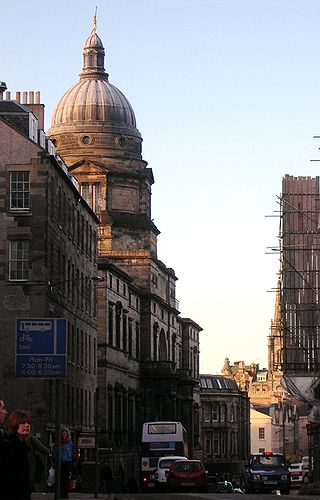Related Research Articles

A Juris Doctor, Doctor of Jurisprudence, or Doctor of Law (JD) is a graduate-entry professional degree that primarily prepares individuals to practice law. In the United States, it is the only qualifying law degree. Other jurisdictions, such as Australia, Canada, and Hong Kong, offer both the postgraduate JD degree as well as the undergraduate LL.B., BCL, or other qualifying law degree depending on the requirements of the jurisdiction where the person will practice law.

Legal education is the education of individuals in the principles, practices, and theory of law. It may be undertaken for several reasons, including to provide the knowledge and skills necessary for admission to legal practice in a particular jurisdiction, to provide a greater breadth of knowledge to those working in other professions such as politics or business, to provide current lawyers with advanced training or greater specialisation, or to update lawyers on recent developments in the law.
A Bachelor of Laws is an undergraduate law degree offered in most common law countries as the primary law degree and serves as the first professional qualification for legal practitioners. This degree requires the study of core legal subjects and jurisprudence to provide a comprehensive understanding of the legal system and its function. The LLB curriculum is designed to impart a thorough knowledge of legal principles, legal research skills, and a sound understanding of the roles and responsibilities of lawyers within society. This degree is often a prerequisite for taking bar exams or qualifying as a practising lawyer, depending on the jurisdiction. Additionally, the LLB program also serves as a foundation for further legal education, such as a Master of Laws (LLM) or other postgraduate studies in law.
A Master of Laws is an postgraduate academic degree, pursued by those either holding an undergraduate academic law degree, a professional law degree, or an undergraduate degree in a related subject. In many jurisdictions, the LL.M. is an advanced professional degree for those usually already admitted into legal practice.

The Common Professional Examination/Postgraduate Diploma in Law (CPE/PGDL) is a postgraduate law course in England and Wales taken by non-law graduates wishing to become either a solicitor or barrister in England and Wales. It is being replaced by the Solicitors Qualifying Examination (SQE) which was introduced on 1 September 2021.
The Legal Practice Course (LPC) – also known as the Postgraduate Diploma in Legal Practice – is a postgraduate course and the final educational stage for becoming a solicitor in England, Wales and Australia. The course is designed to provide a bridge between academic study and training in a law firm. It is a one-year, full-time course, and tuition fees range from £8,000-£17,300 a year. A small proportion of students may have their fees and some living expenses paid for by future employers under a training contract.
TheUniversity of Law is a private for-profit university in the United Kingdom, providing undergraduate and postgraduate degrees in law, business, psychology, criminology, policing and computer science. It also provides postgraduate courses in education, and specialist legal training and continuing professional development courses for British barristers, solicitors and trainees; it is the United Kingdom's largest law school. It traces its origins to 1876.
Legal executives are a kind of trained legal professional in certain jurisdictions. They often specialise in a particular area of law. A legal executive usually receives both vocational training and academic training.

In the United Kingdom, Australia, Hong Kong, Ireland, and certain other English common law jurisdictions, a trainee solicitor is a prospective lawyer undergoing professional training at a law firm or an in-house legal team to qualify as a full-fledged solicitor. This period of training is known as a training contract and usually lasts for two years.
The Graduate Diploma in Law/Postgraduate Diploma in Law/Common Professional Examination (GDL/PGDL/CPE) is a postgraduate law course in England and Wales that is taken by non-law graduates wishing to become either a solicitor or barrister in England and Wales. The course allows non-law students to convert to law after university ; it is commonly known as a "law conversion course". Regulated by the Solicitors Regulation Authority, the course is designed as an intense programme covering roughly the same content as a law degree LL.B (Hons) and the main goal is to allow people with a greater variety of educational backgrounds into the legal profession.

Cardiff School of Law and Politics, also known as Cardiff Law School is part of Cardiff University in Cardiff, Wales. It confers LLB and LLM degrees for British and international students.
Nottingham Law School is a law school in the UK with over 100 full-time lecturers and over 2,500 students. It is an academic and professional institution, part of Nottingham Trent University.
Legal education in the United Kingdom is divided between the common law system of England and Wales and Northern Ireland, and that of Scotland, which uses a hybrid of common law and civil law.
An admission to practice law is acquired when a lawyer receives a license to practice law. In jurisdictions with two types of lawyer, as with barristers and solicitors, barristers must gain admission to the bar whereas for solicitors there are distinct practising certificates.
BPP University Law School is a private, for-profit provider of professional and academic legal education in the United Kingdom and one of the founding schools of BPP University.

Kaplan Law School was a for-profit educational institution offering post-graduate legal training in London for those wishing to become a solicitor in England and Wales. In April 2016, it announced the closure of all programmes to new applicants, effectively ending the school’s activities.

The Diploma in Legal Practice or Diploma in Professional Legal Practice is a Scottish postgraduate qualification required in order to practise law in Scotland, as either a solicitor or an advocate. It is undertaken after completing undergraduate study and before commencing a traineeship.
Legal education in Hong Kong generally refers to the education of lawyers before entry into practice.
BPP University is a private university in the United Kingdom.
Westminster Law School (WLS) is the law school of the University of Westminster. Located at Little Titchfield Street near Regent Street in central London.
References
- ↑ Burnett, Justina (2006). Getting Into Law. Crimson Publishing. p. 60. ISBN 1844550672.
- ↑ "City firms plan law courses". Times Higher Education. 14 January 2000. Retrieved 18 March 2012.
- ↑ "Weighting the justice scales". Times Higher Education. 14 July 2000. Retrieved 18 March 2012.
- ↑ "OxILP slashes LPC fees following takeover". The Lawyer. 6 February 2008. Retrieved 10 June 2013.
- ↑ "Oxford exam-fail law student loses compensation bid". BBC News. 18 March 2011. Retrieved 16 March 2012.
- 1 2 Metcalfe, Christian (13 March 2013). "University of Law to look at Oxford expansion following LPC agreement". The Lawyer. Retrieved 10 June 2013.
- ↑ Waller-Davies, Becky (8 March 2013). "Oxford Brookes responds to LPC closure criticism". The Lawyer. Retrieved 10 June 2013.